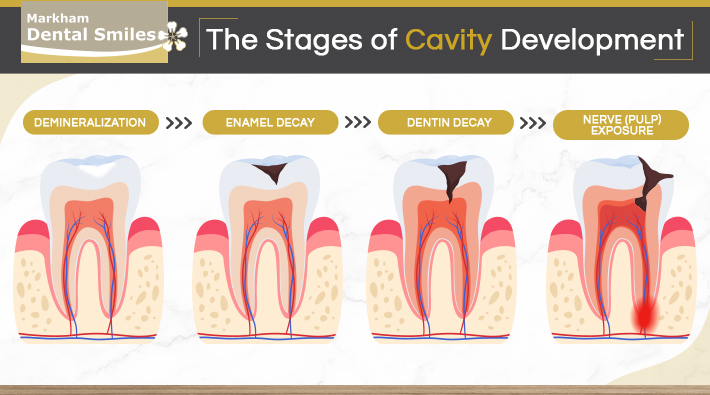In many cases, it’s quite difficult to see a cavity on your own. Because cavities often develop between teeth or on teeth near the back of your mouth, it’s rare to be able to see one without X-rays and a dental exam.
Cavities are typically tiny and hard to see with the naked eye, but as they progress, they can appear as white spots on your teeth, dark spots of tooth discolouration, cracks and holes in teeth, and as dark shadows on your teeth in dental X-rays.
Not all cavities need a filling, but if they’re not detected and treated early, your risk of needing restorative dentistry can increase. Without treatment, you may eventually need a root canal.
How Do You Know if You Have a Cavity?
The appearance and feeling of cavities can vary based on their size and how long they have been affecting your teeth.
Without routine dental exams and cleanings, it’s rare to spot cavities during their early stages. During later stages, you may experience several symptoms that are signs of a cavity. In rare cases, you may also see visible changes to your teeth, such as discolouration or cracks and holes.
For cavities that have progressed into serious late stages, you may be able to feel holes and rough edges on your teeth with your tongue, and you may feel parts of your tooth breaking off when you bite down.
What Does a Beginning Cavity Look Like?
During their earliest stages of development, cavities are typically tiny holes or dents in the outside layer of your teeth—your enamel.
Early cavities that only affect your enamel may cause discolouration that makes small spots on your teeth look whiter as your enamel wears away. When only your enamel has been affected by tooth decay, it may still be possible to reverse cavities.
Tooth discolouration can also be caused by other issues, like surface tooth stains, so when you notice discolouration, it’s important to visit your dentist for an exam to get a clear understanding of what’s affecting your teeth and what you can do to address that problem.
Some early cavities can be too small to detect with an X-ray, but they can be spotted with other specialized tools. During a dental cleaning, your dentist can examine the surface of your teeth and look for areas where dental instruments catch in tiny holes.
What Are the Symptoms of a Cavity?
You may not experience any symptoms during the earliest stages of a cavity, but over time, there are several issues that can occur, including:
- Toothaches
- Tooth sensitivity
- Pain when eating sugary foods
- Dark spots on a tooth
- A hole in your tooth you can see or feel with your tongue
- Chronic bad breath
- Bleeding or swollen gums
Does a Cavity Go Away on Its Own?
Untreated cavities will not typically go away on their own—instead, they may get worse over time.
During a cavity’s earliest stages, it may be possible to reverse its progression with a professional dental cleaning and regular brushing and flossing. However, that doesn’t mean you should ignore a cavity if you spot one—especially if you are already brushing and flossing regularly.
If you can see or feel the signs of a cavity, it is often too late to reverse its progression, and some form of treatment may be necessary.
Routine dental exams can help you detect cavities early and maintain your oral health without worrying about restorative dental procedures like fillings and root canals.

What Are the Stages of a Cavity?
Cavities typically progress through 4 stages:
- Demineralization: During this early stage, only the surface of your teeth is affected, and it may still be possible to reverse cavity development.
- Enamel decay: At this stage, a tiny hole can form in your enamel that requires minimal treatment to reverse the decay and prevent further development.
- Dentin decay: When untreated cavities eat through your enamel and reach your dentin, you may experience increased pain and sensitivity. At this stage, prompt treatment is crucial for preventing root canals and tooth loss.
- Nerve exposure: Cavities that reach the inner pulp layer of your teeth are very serious. At this stage, cavities can be quite painful, and if your tooth’s pulp, which holds your tooth’s nerves, becomes infected, you may need a root canal or tooth removal.
How Long Can a Cavity Go Untreated?
A cavity should not go untreated. The longer you wait to seek treatment for a cavity, the more invasive and serious the treatment needed to address the problem could become. Even during the early stages, it’s important to detect and treat cavities before they get worse.
How Can You Prevent Cavities?
Following a complete oral hygiene routine and getting regular dental care each year are essential habits for preventing cavities. Some of the strategies we recommend for our patients include the following:
- Brush twice a day for 2 minutes with fluoridated toothpaste.
- Floss at least once a day.
- Reduce and limit the amount of sugary foods you eat.
- Rinse your mouth with water after eating, especially after eating sugary foods.
- Schedule dental exams and cleanings approximately every 6 months or according to your dentist’s recommendations.

When Should You See a Dentist for a Cavity?
Even cavities on baby teeth can have serious consequences. At Markham Dental Smiles, we care about your lifelong dental health, and we encourage you to visit us at the first sign of changes to your teeth or gums. Routine dental care is the key to detecting and preventing cavities. Book an appointment with us today to schedule your next checkup or get help assessing recent issues affecting your teeth.







